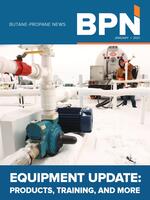
The month of July began as usual—hot and muggy with a hint of rain. Then the phones started ringing. And the craziness of the world around us seemed to be finally getting to the propane marketers.
Pickup trucks are being stolen, trailers are disappearing, buildings are being vandalized, valuable equipment is being stolen, and a new type of claim is being filed.
The COVID-19 pandemic has put millions of Americans out of work, causing a sense of desperation that is getting stronger the longer the virus persists. This is increasing crime not only against property, but also against people. According to one source that I read, the national average is a robbery occurs every two minutes somewhere in the United States.
Marketers need to be vigilant at their plant sites to prevent loss of equipment or vandalism that could cost in the thousands of dollars. They need to protect their property by checking the lighting around their buildings and plant site. Trailers and equipment stored outside the fence should have extra lighting making it less likely that you will be a target.
Install cameras to cover the entire property, especially the back and side yards. It was a security camera that caught the arsonist who set fire to a large general store in Michigan that kept a propane marketer from being drawn into that huge claim.
Cameras are inexpensive and most have Bluetooth capabilities to enable the owner to view the entire plant area using their cell phones.
By the way, many marketers have propane tanks lying around their property either waiting to be installed or recently removed from customer sites and waiting to be refurbished. Are the tanks’ serial numbers recorded in the office so, if the tanks are stolen, you could prove that they belong to you? Unfortunately, many marketers store both new and old tanks out in the open without fencing.
What about the trailers stored on the back of the lot? Most marketers have a number of reasons to own trailers. Trailers are also fairly easy to steal. Pull a vehicle with a trailer hitch into the yard, back up to the trailer, drop the hitch onto the ball, hook up the chains and the lights, and the trailer is gone. What did you do to prevent the theft?
A quick search of the internet provides numerous ways to secure the trailers from being easily stolen. The easiest is to go to amazon.com and go to “auto trailer accessories.” They have numerous types of devices to prevent or deter criminals from stealing your trailer, and pricing is from $265.00 down to $17.89, depending on the device chosen.
What do you do with the keys to your vehicles? Are all vehicles locked when parked at the end of the workday? What about the old hidden key trick? Seems that everyone hides the extra key, in the same places on or around the vehicles, making it easier for the thief. One of the vehicles reported stolen had a blackened hideout key left on the seat when it was found.
We are seeing an increase of claims from small claims courts. This may be the result of an insurance company denying a claim, or it could be from a minor fender bender where the damage was so slight that the marketer decided to pay for the physical damage out of pocket rather than turning a claim into his insurance company.
When this happens, there is no police report, usually no pictures, and the marketer was in a hurry. No information collected from the other driver because it was “so” minor. Until suddenly the marketer is presented with a notice that they are being sued in small claims court for the damage caused by the “minor” accident.
When they receive the small claims notice is when they call their agent to report a claim; however, there is nothing that the insurance company can do. Small claims courts do not allow attorneys to defend or make the case. It is you against the party that is suing, your memory of events compared to theirs, and their story is going to be a tearjerker—the big, bad propane company against the little guy.
And what do you have to disprove the claim? Some states have small claims court limits which are fairly small, while other states allow claims up to $10,000. A claim of $10,000 dollars is real money that a marketer will have to pay themselves if they lose, all because they were in a hurry.
If you’re involved in an accident:
- Never—“make a deal” for damages.
- Never—leave the scene of even a minor accident.
- Never—accept an offer of cash, check, or “private” settlement.
- Never—disavow injury to you or your passengers.
- Never—offer to pay anything even if you think you are at fault.
- Never—administer first aid unless you are licensed to do so.
- Always—(when conditions permit) move to shoulder or other “safe area” to prevent further damage.
- Always—ask someone to summon police and seek medical assistance. Repeat at five-minute intervals.
- Always—remember the 3 C’s : Remain calm, courteous, consistent in your version of the accident.
- Always—obtain complete information from those involved.
- Always—complete the claims report on the scene—not later
- Always—obtain the names of witnesses including addresses and phone numbers.
Think how you can keep your place safe during these uncertain times, because there is someone out there that is thinking up ways to untie it, unlock it, find the keys, and light it up in the dark.



